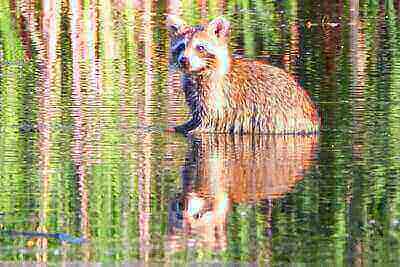Disclosure: We may earn commissions if you purchase products after clicking on a link from our site.
Are you interested in hunting raccoons? Do you want to learn how to hunt raccoons? Raccoons are scavengers and nocturnal animals. They have a very healthy appetite that can be used as an advantage when hunting them. In this article, we share information and knowledge to improve your chances of successfully hunting raccoons.
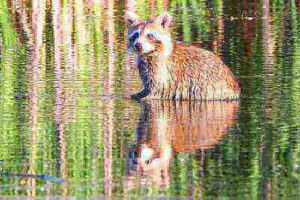
Table of Contents
How To Hunt Raccoons
1. Scouting
Scouting raccoons involves observing their behaviors, habitats, and movements to gather information that can aid in successful hunting or management efforts. Raccoons are primarily nocturnal and often inhabit wooded areas, wetlands, and urban environments.
When scouting, hunters and wildlife managers look for signs such as tracks, scat, and distinctive feeding sites, which can indicate the presence of raccoons. Additionally, scouting involves identifying den sites, such as hollow trees, brush piles, or underground burrows, where raccoons seek shelter during the day.
Trail cameras can be valuable tools for scouting raccoons, capturing images of their activity patterns, and providing insight into their movements and behaviors. By thoroughly scouting raccoon habitats and gathering pertinent information, hunters and wildlife managers can develop effective strategies for hunting, trapping, or managing raccoon populations responsibly and sustainably.
2. Predator Calls
Using predator calls when hunting raccoons can be an effective strategy to attract them into the shooting range. Raccoons are opportunistic feeders and are known to investigate sounds that mimic distress calls of small mammals or prey species.
Hunters typically use electronic or handheld predator calls that emit realistic sounds such as rabbit distress or rodent squeaks to lure raccoons out of cover. Additionally, distress calls can trigger a predatory response in raccoons, prompting them to investigate the source of the sound in search of potential prey.
When using predator calls, hunters should strategically place them in areas frequented by raccoons, such as near known den sites, travel corridors, or feeding areas. Hunters need to remain concealed and motionless while calling to avoid spooking wary raccoons. While predator calls can be effective, hunters should always adhere to local hunting regulations and ethical guidelines to ensure responsible and humane hunting practices.
Use predator calls to call raccoons. “Squaller” calls bring out aggressive males during the mating season which takes place in January and February. Chittering and purring calls can also be used to lure out raccoons or entire families.
3. Hunting Raccoons With Dogs
Hunting raccoons with dogs, often referred to as raccoon hunting with hounds, is a traditional and popular method utilized by many hunters. Specially trained hounds, such as coonhounds or foxhounds, are employed to track, tree, and sometimes bay raccoons.
These dogs possess keen scenting abilities and are trained to follow the scent trails left by raccoons, often starting the pursuit after sunset when raccoons become more active. Once a raccoon is treed or cornered, the dogs bay or bark to alert the hunter to the location of the quarry.
Hunters then approach the tree or area and typically dispatch the raccoon with firearms or other humane methods. Hunting raccoons with dogs requires patience, skill, and a strong bond between the hunter and their canine companions. It also fosters camaraderie among hunters and their dogs, making it a cherished tradition in many hunting communities. However, hunters need to follow local regulations and ethical guidelines to ensure the safety and welfare of both the dogs and the raccoons being pursued.
As stated earlier, one of the popular methods of hunting raccoons is using dogs. Coonhounds are dogs that are used to hunt raccoons because of their ability to trail a scent. There are 6 coonhounds, namely the black and tan coonhound, the redbone coonhound, the English coonhound, the bluetick coonhound, the treeing walker coonhound, and the Plott hound.

4. Spotlighting
Spotlighting, also known as night hunting or shining, is a controversial method used by some hunters to pursue raccoons after dark. This technique involves using powerful spotlights or handheld lights to illuminate the nocturnal activities of raccoons.
Hunters typically drive or walk slowly along roads or trails while scanning the surrounding area with spotlights to locate raccoons. Once spotted, hunters may use firearms or other means to dispatch the raccoons. While spotlighting can be an effective way to target raccoons during their most active hours, it is subject to strict regulations in many areas due to safety concerns and ethical considerations.
Unregulated spotlighting can disrupt wildlife behavior, pose risks to other hunters or individuals in the area, and lead to the indiscriminate killing of non-target species. Therefore, hunters should familiarize themselves with local laws and regulations regarding spotlighting and always prioritize safety and ethical hunting practices when pursuing raccoons or any other game species.
5. Bait
Using bait when hunting raccoons is a common and effective strategy to attract these nocturnal mammals into shooting range. Hunters typically set up bait stations in areas frequented by raccoons, such as near den sites, along travel routes, or around food sources like garbage dumps or agricultural fields.
Bait can consist of a variety of enticing foods, including sweet corn, fruits, marshmallows, or commercially available raccoon baits. Additionally, some hunters use scented attractants or lures to enhance the effectiveness of their bait stations.
Once raccoons discover the bait, they are drawn to the area, providing hunters with an opportunity to take a shot. However, hunters should always ensure that their baiting practices comply with local hunting regulations and ethical guidelines to promote responsible and sustainable hunting practices while minimizing the risk of attracting non-target species.
6. Weapon of Choice
The type of weapon you use for hunting raccoons depends on the reason you are hunting them. Use smaller calibers if you want to preserve the animal as the home decor for your hunts. However, if you are hunting raccoons to get rid of the scavengers, then you can use larger calibers like a shotgun. A .22 caliber rifle or shotgun will work if you want the pelt or want to keep the raccoon as a trophy.
Raccoons are tough and you may be in for a surprise if you use the regular bullet to hunt raccoons. Use predator and varmint cartridges that can penetrate tough hides if you want to take down larger and more aggressive male raccoons.
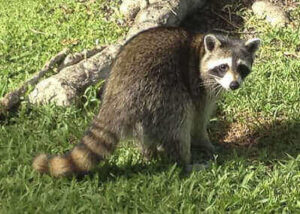
7. Traps
Using traps is a common and effective method for hunting raccoons, particularly for those seeking to manage raccoon populations or control nuisance behavior. Traps come in various designs, including cage traps, foothold traps, and body-gripping traps, each with its advantages and considerations.
Cage traps are humane options that capture raccoons alive, allowing hunters to relocate or dispatch them according to local regulations. Foothold traps and body-gripping traps are designed to restrain or quickly dispatch raccoons upon capture, but they require careful placement and monitoring to minimize non-target captures and ensure humane treatment.
Traps are typically baited with enticing foods such as sweet corn, marshmallows, or commercially available raccoon baits to lure raccoons into the trap. Successful trapping often requires knowledge of raccoon behavior, proper trap placement, and compliance with local trapping regulations to ensure ethical and effective outcomes.
If you are hunting raccoons to just get rid of them on your property, traps are a good option. The downside of traps is that they can pose danger to kids in your home who may see them and be curious to find out what it is. Additionally, a trap can only be as effective as the type of bait you place in it and where it is placed.
There is also the possibility that the trap may catch the wrong animals. Moreover, a trap can only catch one raccoon at a time. If you have a family of raccoons on your property, it could take some time to get rid of them with a few traps.
8. State Laws
In most states, raccoons are classified as open-season animals. This implies that it can be hunted all year round. However, there may be some states that have other laws regulating the hunting of raccoons. Get to know your state laws regarding hunting raccoons before hunting them. You can read your site hunting laws on this website.
How To Hunt Raccoons At Night
1. Hunting Areas
When hunting raccoons at night, you want to locate areas where raccoons are often found during the night. Raccoons are most active at night and will go search for food during the night. Look for food sources that raccoons will be in search of during the night. Fruit or nut-bearing trees that at in the vicinity of water sources are prime attractions for raccoons searching for food.
2. High-Quality Optics
Use high-quality binoculars, riflescopes, or spotting scopes to find raccoons during the night. With visibility reduced, you will need good optics to clearly see the raccoon you want to take a shot at. We reviewed the best hunting riflescopes and the best hunting binoculars on the market today which you can read them here.
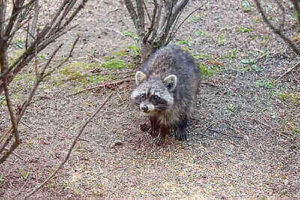
3. Spotlighting For Raccoons
When spotlighting for raccoons, you want to locate fruit or nut-bearing trees with raccoons and use white or red beam spotlights to find raccoons. The white beam spotlights are great for locating raccoons at long distances, however, they will spook the raccoons. The raccoons will run down the tree to seek cover in the tree trunk or its burrow after the white light is shone on it.
However, a red-beam spotlight can locate a raccoon in a tree without spooking it. After locating raccoons in a tree with a spotlight, you or a hunting partner must be ready to take a shot at the raccoon.
4. Trail Cameras
You can set up trail cameras in an area to collect information on raccoons. The information you collect about their movements and patterns at night can help you plan where and how to hunt raccoons at night. We did a review of the best trail cameras on the market today that you can read here.
5. Predator Calls
Use predator calls like squaller calls or a mouse squeaker to lure raccoons out of their dens. Chittering and purring calls can also be used to lure raccoons or entire families out of their dens. We reviewed the best predator calls on the market and you can access it from this link.
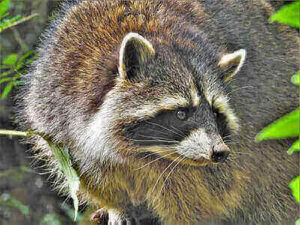
How To Hunt Raccoons At Night Without Dogs
1. Trail Cameras
Set up trail cameras in an area you suspect raccoons frequent to get information about their movements and behaviors. This information will help you know where to set up your hunting spot and how to hunt them. You may also learn how many of them are in a family, what they eat in the area, and where are their food sources.
2. Bait
You can use bait to lure raccoons out of their dens when you hunt without dogs. Raccoons eat almost everything and have a very good appetite. You can use food scraps, fresh fish, fruits, nuts, watermelon, etc. to lure them out. Find bait that is smelly. The smellier, the better. Once raccoons pick up the scent, they will come out to the smelly bait.
3. Predator Calls
When you are hunting raccoons without dogs, you can also use predator calls to lure curious and hungry raccoons out of their dens. Squaller, chittering, and mouse squealer and purring calls can be used to lure raccoons.
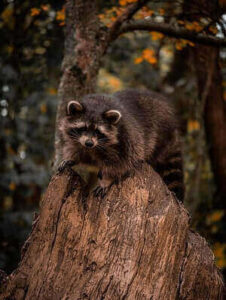
Raccoon Hunting Tips
1. Raccoons are nocturnal animals and are most active during the night.
2. Raccoons eat fruits, nuts, berries, insects, rodents, frogs, fish, livestock troughs, and plants.
3. One of the best places to hunt raccoons is in a wooded pasture with fruit or nut-bearing trees with a water source close by.
4. Raccoons live in hollow trees, wooded piles, and burrows. These are the places they can be found during the day.
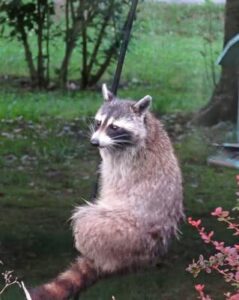
5. Raccoons are the least active on a full moon.
6. Springtime is the best time to call raccoons with electronic or hand calls.
7. Spotlighting for raccoons involves using a light beam to locate raccoons in trees at night and take shots at them.
8. You can use just about any food to bait raccoons. Smelly bait works great to lure raccoons out of their dens.

9. Raccoons are tough animals and a regular bullet may not take down a large and aggressive male raccoon.
10. Get a high-quality scope to hunt raccoons during the night. Spotting scopes, binoculars, and riflescopes can be used to clearly see raccoons during the night. We reviewed the best spotting scopes on the market and you can read it here.
11. The type of weapon you use to take down a raccoon depends on the reason you are hunting it. If you want to keep it as home decor, then use small caliber firearms. Use larger caliber firearms if you want to get rid of raccoons that are a nuisance to your home or farm.
12. Use trail cameras to collect information on the behaviors and movements of raccoons. This information will help you plan your hunt for the raccoons.
13. You can use a trap to also hunt raccoons.
14. Check your state laws concerning hunting raccoons. They are considered an open-season animal in many states but may not be for all states.
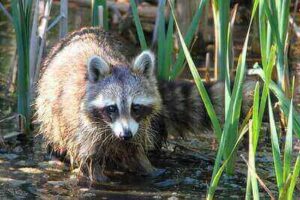
The Bottom Line
Hunting raccoons is challenging as they are tough pests that are most active during the night. Raccoons eat almost anything and this voracious appetite can be used by hunters to bait these scavengers.
With good scouting and planning, you can successfully hunt raccoons. In this article, we share information and knowledge about hunting raccoons to help you hunt them. You can read how to hunt groundhogs and how to hunt beavers,
